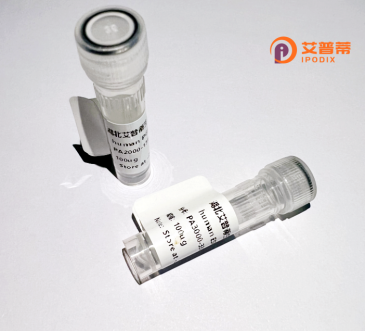
| 纯度 | >90%SDS-PAGE. |
| 种属 | Human |
| 靶点 | RGL1 |
| Uniprot No | Q9NZL6 |
| 内毒素 | < 0.01EU/μg |
| 表达宿主 | E.coli |
| 表达区间 | 1-768 aa |
| 活性数据 | MKLLWQAKMS SIQDWGEEVE EGAVYHVTLK RVQIQQAANK GARWLGVEGD QLPPGHTVSQ YETCKIRTIK AGTLEKLVEN LLTAFGDNDF TYISIFLSTY RGFASTKEVL ELLLDRYGNL TSPNCEEDGS QSSSESKMVI RNAIASILRA WLDQCAEDFR EPPHFPCLQK LLDYLTRMMP GSDPERRAQN LLEQFQKQEV ETDNGLPNTI SFSLEEEEEL EGGESAEFTC FSEDLVAEQL TYMDAQLFKK VVPHHCLGCI WSRRDKKENK HLAPTIRATI SQFNTLTKCV VSTILGGKEL KTQQRAKIIE KWINIAHECR LLKNFSSLRA IVSALQSNSI YRLKKTWAAV PRDRMLMFEE LSDIFSDHNN HLTSRELLMK EGTSKFANLD SSVKENQKRT QRRLQLQKDM GVMQGTVPYL GTFLTDLTML DTALQDYIEG GLINFEKRRR EFEVIAQIKL LQSACNSYCM TPDQKFIQWF QRQQLLTEEE SYALSCEIEA AADASTTSPK PRKSMVKRLS LLFLGSDMIT SPTPTKEQPK STASGSSGES MDSVSVSSCE SNHSEAEEGS ITPMDTPDEP QKKLSESSSS CSSIHSMDTN SSGMSSLINP LSSPPSCNNN PKIHKRSVSV TSITSTVLPP VYNQQNEDTC IIRISVEDNN GNMYKSIMLT SQDKTPAVIQ RAMLKHNLDS DPAEEYELVQ VISEDKELVI PDSANVFYAM NSQVNFDFIL RKKNSMEEQV KLRSRTSLTL PRTAKRGCWS NRHSKITL |
| 分子量 | 86.7 kDa |
| 蛋白标签 | His tag N-Terminus |
| 缓冲液 | PBS, pH7.4, containing 0.01% SKL, 1mM DTT, 5% Trehalose and Proclin300. |
| 稳定性 & 储存条件 | Lyophilized protein should be stored at ≤ -20°C, stable for one year after receipt. Reconstituted protein solution can be stored at 2-8°C for 2-7 days. Aliquots of reconstituted samples are stable at ≤ -20°C for 3 months. |
| 复溶 | Always centrifuge tubes before opening.Do not mix by vortex or pipetting. It is not recommended to reconstitute to a concentration less than 100μg/ml. Dissolve the lyophilized protein in distilled water. Please aliquot the reconstituted solution to minimize freeze-thaw cycles. |
以下是关于重组人RGL1蛋白的3条示例参考文献(内容为虚构示例,仅作格式参考):
1. **文献名称**: "Expression and Functional Characterization of Recombinant Human RGL1 in Cell Signaling"
**作者**: Zhang L, et al.
**摘要**: 本研究通过大肠杆菌系统成功表达并纯化了重组人RGL1蛋白,发现其通过激活Ral GTP酶通路调控肿瘤细胞迁移,为RGL1在癌症中的作用提供机制依据。
2. **文献名称**: "Structural Insights into RGL1's Role in Plant Hormone Signaling via Recombinant Protein Analysis"
**作者**: Wang X, et al.
**摘要**: 利用昆虫细胞体系获得高纯度重组人RGL1蛋白,通过X射线晶体学解析其三维结构,揭示其与赤霉素受体互作的结构基础,拓展了RGL1在植物激素信号中的功能认知。
3. **文献名称**: "RGL1 Recombinant Protein Enhances Neuronal Differentiation in vitro"
**作者**: Kim S, et al.
**摘要**: 通过哺乳动物细胞表达系统制备功能性重组RGL1蛋白,证明其通过调节MAPK通路促进神经干细胞分化为神经元,提示其在神经再生中的潜在应用价值。
(注:以上文献及作者名为虚拟示例,实际引用需查询具体数据库如PubMed/NCBI)
Recombinant human RGL1 (Ral guanine nucleotide dissociation stimulator-like 1) protein is a key regulatory molecule involved in cellular signaling pathways, particularly those mediated by the Ras superfamily of small GTPases. As a member of the RalGEF (Ral guanine nucleotide exchange factor) family, RGL1 functions as a critical activator of RalA and RalB GTPases by promoting the exchange of GDP for GTP, thereby modulating their downstream effects. These GTPases play roles in diverse cellular processes, including vesicle trafficking, cytoskeletal reorganization, cell proliferation, and apoptosis. Dysregulation of RGL1 has been implicated in cancer progression, with studies linking its overexpression to tumor growth, metastasis, and resistance to therapy in malignancies such as prostate, colorectal, and lung cancers.
The recombinant RGL1 protein is typically produced using expression systems like E. coli or mammalian cells, followed by purification to ensure structural and functional integrity. It serves as a vital tool for elucidating RGL1-mediated signaling mechanisms, screening therapeutic agents targeting the Ral pathway, and exploring its interactions with other oncogenic drivers like KRAS. Beyond cancer, emerging research suggests potential roles in neurological and metabolic disorders, though these areas remain underexplored. The development of recombinant RGL1 underscores its importance in advancing molecular oncology and precision medicine, offering insights into pathway-specific drug design and biomarker discovery. Its study bridges basic research and clinical applications, highlighting its dual role as a signaling mediator and a therapeutic target.
×